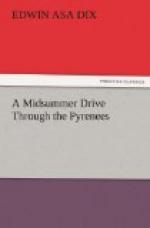At the upper end of the street is the long, grim bath-establishment, and we enter its stone corridors and are led about by a noiseless and mournful attendant. Here are rows of waiting sedan-chairs; an office for presentation of tickets; long lines of stone cells, each with its tub or douche or vapor-box; and underground, public tanks of larger size. “I inconsiderately tasted the spring,” records a traveler of years ago, “and, if you are anxious to know what it is like, you may be satisfied without going to Bareges, by tasting a mixture of rotten eggs and the rinsings of a foul gun-barrel.” Our spirits fall lower and lower in this damp impluvium; never before have we felt so grateful over our limitless good health; we dodge out with relief into the darkening air, and, under the beginnings of a rain-storm, thankfully slip back to the refuge of the hotel.
Certain it seems that if cheerful surroundings are essential to a cure, the waters of Bareges must fail of their full mission.
They accomplish remarkable things, notwithstanding; they are among the strongest of the Pyrenean baths, and are particularly noted for their power in scrofulas and grave skin-disorders, wounds, ulcers and serious rheumatic affections. So healing for wounds are they, that the government sustains here a military hospital for maimed and disabled soldiers. In winter the scene is desolation. The cold is rigorous. Avalanches pour down from the mountains on both sides and often leave little for the spring freshets to do. Modern engineering grapples even with avalanches; wide platforms have been cut in the rocks above the town, on the slopes most exposed, and immense bars of iron set in them and attached with chains. These outworks have proved themselves surprisingly effective in breaking the force of the snowslides; but the scent of danger is always in the air; the ledge of the town is for months deep in drifts; the frailer houses are taken up, the rest closed and stoutly barred; the inhabitants are gone, leaving behind a few old care-takers to hold their lonely revels in the solitudes.
III.
We sit about in the evening in the dim little parlor, and agree once more that Bareges has not been exaggerated. We are united in will to leave this detestable spot to its ghosts of ruin and disease, and to leave it as quickly as we can. Our Luz driver, whom we have judiciously retained to remain with his landau over night, appears respectfully at the door, and is instantly instructed to be ready early in the morning for farther progress; he looks dubious, and warns us of continuing rain; it is nothing; we leave to-morrow in any weather.
“Have you found us a second carriage?” I ask him.
“Monsieur, there is but a petite voiture, a small wagonette, up the street, which one could hire; it is small; if monsieur will have the goodness to come out with me to see it?”




